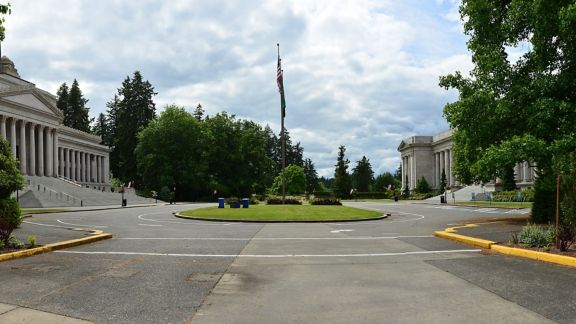Artificial Intelligence in STEM Higher Education: Opportunities, Challenges & Ethical Dilemmas
September 2024
Artificial intelligence (AI) is transforming higher education, particularly in science, technology, engineering, and mathematics (STEM) fields.
The nature of that transformation—its potential benefits and downsides and how education institutions are navigating them—is a growing area of inquiry and expertise at NORC. This brief summarizes our current perspective on AI and STEM higher education, and where we think things might be going.
AI creates immense opportunities.
By leveraging AI-powered systems, educational institutions can streamline administrative tasks such as admissions processes, course scheduling, and student support services and save resources for more strategic initiatives and enhancing operational efficiency. In addition, AI algorithms can play a pivotal role in facilitating personalized learning experiences tailored to individual student needs and preferences, which fosters deeper engagement and academic achievement (Zawacki-Richter, et al., 2019). The integration of AI into STEM higher education has already given key stakeholders the capacity to make well-informed decisions, guiding strategic planning, resource allocation, and interventions aimed at bolstering student success (Crompton & Burke, 2023; Nagaraj, et al., 2023; Xu & Ouyang, 2022).
Researchers from NORC at the University of Chicago are exploring how U.S. graduate schools implement AI across multiple aspects of graduate education. With support from the Alfred P. Sloan Foundation (grant number G-2024-22540, Artificial Intelligence in Graduate STEM Education), a landscape analysis will illuminate the current status of AI utilization in the top 300+ STEM degree-awarding institutions. Based on these findings, a representative group of graduate school leaders will convene to explore the potential for a community-based framework to assess implementing AI in the graduate education system, focused on strengthening the enterprise, including efforts to broaden success in STEM graduate education.
Current applications of artificial intelligence in learning platforms extend to the delivery of personalized mathematics instruction to students, which adapt to individual learning styles, offer immediate feedback, and customize pathways to address specific learning needs (Celepkolu & Hamilton, 2024; Nagaraj, et al., 2023). Research supports the efficacy of this personalized approach in enhancing student engagement, comprehension, and achievement in mathematics (Nagaraj, et al., 2023). In addition, AI-powered robotics and engineering education platforms have seen increased use, providing students with opportunities to design, build, and program robots using AI-driven tools and software (Verner, et al., 2020). This hands-on approach cultivates critical thinking and collaboration skills, igniting students' interest in robotics and engineering and fostering a profound understanding of STEM principles.
AI offers immersive and interactive learning experiences, as exemplified by virtual science laboratory simulations (Nagaraj, et al., 2023). These activities allow students to conduct experiments and explore scientific concepts in a controlled environment, guided by real-time feedback and adaptive learning mechanisms. Students develop scientific inquiry skills and attain a deeper understanding of complex scientific phenomena as a result.
AI technologies also hold promise in increasing accessibility and inclusion in higher education. Natural language processing (NLP) provides students with 24-hour access to virtual assistants and chatbots, which answer questions and queries related to course materials. In addition, features such as real-time language translation, automatic captioning, text-to-speech, and adaptive learning platforms cater to the diverse needs of students, including those with disabilities. AI provides a bridge for students with disabilities to enter and thrive in STEM fields within higher education by removing barriers and providing crucial complementary supports.
AI also poses challenges and ethical dilemmas.
However, the widespread adoption of AI in higher education also poses significant challenges and ethical considerations that call for careful examination and mitigation strategies. Concerns about student privacy, data security, and the potential for algorithmic bias to perpetuate educational inequalities demand attention (Slimi & Carballido, 2023; Celepkolu & Hamilton, 2024). Accuracy and reliability of the AI systems in educational systems is a challenge as errors or inconsistencies can hinder learning and undermine trust in the technology.
Additionally, there is a valid concern that AI-driven instructional methods could prioritize efficiency over deep learning, potentially resulting in a superficial grasp of STEM concepts. Student motivation and engagement are also concerns with the use of AI in STEM education as these tools might affect students’ intrinsic motivation and engagement. A dependence on technology and the looming risk of job displacement within academia raise questions about workforce readiness. Furthermore, the concerns of the preservation of problem-solving and critical thinking skills and human interaction in the learning process are threats that need to be considered.
As we navigate the nexus of AI and STEM education, we must remain keenly aware of ethical dilemmas. Artificial Intelligence has become an integral part of our lives, and it is crucial that we embrace its potential while ensuring safety and fairness for all. Collaboration among developers of AI technology, educators, and policymakers will help promote its integration and shape a future in which AI enriches higher education.
References
Celepkolu, M., & Hamilton, J. (2024, March). Unlocking Hearts and Minds: The Transformative Power of AI-Enhanced High-Dose Tutoring. NORC at the University of Chicago.
Crompton, H., & Burke, D. (2023). Artificial intelligence in higher education: the state of the field. International Journal of Educational Technology in Higher Education, 20(1), 22.
Nagaraj, B., Kalaivani, A., SB, R., Akila, S., Sachdev, H. K., & SK, N. (2023). The Emerging Role of Artificial Intelligence in STEM Higher Education: A Critical review. International Research Journal of Multidisciplinary Technovation, 5(5), 1-19.
Slimi, Z., & Carballido, B. V. (2023). Navigating the ethical challenges of artificial intelligence in higher education: An analysis of seven Global AI Ethics Policies. TEM Journal, 12(2), 590–602. https://doi.org/10.18421/TEM122-02
Schwartz, R., Schwartz, R., Vassilev, A., Greene, K., Perine, L., Burt, A., & Hall, P. (2022). Towards a standard for identifying and managing bias in artificial intelligence (Vol. 3, p. 00). US Department of Commerce, National Institute of Standards and Technology.
Verner, I.M., Cuperman, D., Gamer, S., & Polishuk, A. (2020). Exploring affordances of robot manipulations in an introductory engineering course. International Journal of Engineering Education, 36(5), 1691-1707.
Xu, W., & Ouyang, F. (2022). The application of AI technologies in STEM education: a systematic review from 2011 to 2021. International Journal of STEM Education, 9(1), 59.
Zawacki-Richter, O., Marín, V. I., Bond, M., & Gouverneur, F. (2019). Systematic review of research on artificial intelligence applications in higher education–where are the educators? International Journal of Educational Technology in Higher Education, 16(1), 1-27.
Citation
Telfort, Roseline. (2024, September 27). Artificial Intelligence in STEM Higher Education: Opportunities, Challenges, and Ethical Dilemmas. NORC at the University of Chicago. Retrieved from https://www.norc.org.






